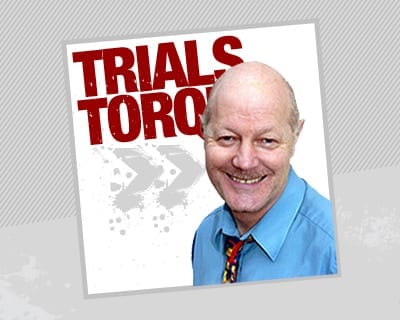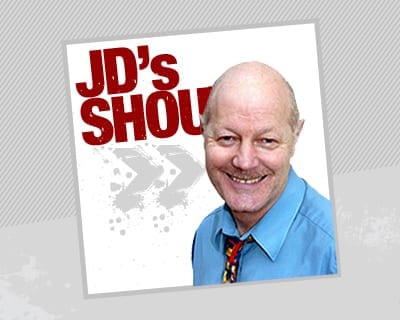Don't Stop me now...
By TMX Archives on 16th Dec 11

It was a coincidence that the running of this years Stratford on Avon Ralph Varden Trial on No-Stop rules occurred just a couple of weeks after the ACU decision to run next years British Championship trials on the same basis, writes Varden organiser Alan Wright.
Run in the steep woods at Fish Hill, Broadway, a group in many a Colmore Cup National, this Midland centre event attracted some 80 entrants. That was 10 more than last year, when in extremely dry weather I was not happy with the event. All day I had watched riders stop, bounce and reposition rather than attempt to keep moving forwards. It delayed the event ,created queues and left the ground scarred with trenches dug by powerful engines using fouth gear.
I resolved that this year we would use No-Stop because I knew they worked perfectly well in the Novagar /S3 and Normandale series.The Club fully agreed. All that was needed was full communication of that decision to all riders and most importantly to all observers. A clear decision to exclude any potential section that could not be ridden without repositioning the back or front wheels was also vital.
So, a brief but concise note of what was required was given to every observer, explaining that they should ask themselves just one simple question. "Did the bike stop”. If the answer was "Yes” then you must give a five. Alternatively if you were not sure –give the benefit of the doubt. It was straightforward and on the day it was a simple fact that none of the observers had a problem.
Many of them in previous No- Stop events had certainly not implemented the rules properly and excused themselves by saying "well, he made a good effort”. They avoided marking as they should. But on Sunday there was not a single dispute. The riders had all been told the trial was over two laps of 15 subs with an A ,B ,and a C route. The event started 15 minutes late at 10.15am through the usual problem of riders not bringing observers along and everyone was told that all observers would vacate their section at precisely 2 pm. In the end, unlike in previous years, the trial was all over by 1.30pm with 15
observers happy not to be left standing around in the cold!
As invariably happens some sections were a bit hard and some a bit easy.Cambers took lots of marks. Yet the excitement of having a few sections that could be ridden at speed was such a change to most that the issue of stopping became totally
irrelevant. Even on the slower speed subs riders made sure they feathered the clutch just enough to keep moving with of course the better riders still being able to "Hop” forwards if they so desired. Some even thought that the observers were still being too lenient!
Strangely one young rider came some distance without his bike just to see what was going on. "I'm not riding under these rules,” he professed to one observer who quickly asked whether he was not able to adapt his style or his mind! He then advised the rider that he was not prepared to observe under any other rules! When also asked if he had ever helped to organise or observe an event the answer was obvious...
At the end of the day the conclusion is that if observing is done properly and sections laid out suitably then the marks lost will probably be higher but the satisfaction level unaltered. Equally importantly, land can be brought back into use that was deemed "too easy " on the "Stop Allowed” rules.
The biggest issue by far is to persuade the ACU trials committee to actually make a decision that all UK trials in 2012 should be run under one set of rules. I'm far from confident that such a decision will actually be taken so in reality it's up to individual centres and their clubs to effect that change. This is already happening in many centres. Write to your own Centre from your club and ask that the change is universally effected!
Don't sit on the fence waiting to see what everyone else does! Do it yourselves, and make it work. Decisions need to be taken. Nothing actually happens if you just talk but leave it to others!
RIDER COMMENTS
Buster Regan: "I enjoyed it. It made you really think because if you got off line it was that much harder to realign yourself without stopping. It's all about refocusing. About getting the line and speed right first time! All UK events need to run under the same rules. Its actually more skilfull to ride No Stop basis and perhaps people don't
appreciate that.”
Mark Hicken: "Consistent decisions made to the No Stop format, as it's laid down, is all that a rider wants. The sport has totally drifted away from the old format when everyone rode the same section. We now have three routes or more because the bikes, and particularly the tyres, are now so much better than the riders. But we don't want all this tightness and squeezing round impossibly tight turns at zero mph. We are not centipedes. No Stop rules helps that.
"The best riders will win whatever so why do we get all this moaning? I spent two days helping mark out the sections.You just have to do it differently then, If its observed properly, there's no problem. This is actually the first trial in years when observers have marked as they used to when I was a kid.”
OBSERVER COMMENTS
Dave Hayward: "I had no issues. I gave plenty of fives where I perhaps wouldn't have in previous No Stop events. This was particularly noticeable when bikes were spinning and even going slightly backwards with the rider dabbing or footing .There was no argument. It was not a problem at all, in fact it made it easier to observe.”
"Usually if you start counting to three or waiting a second before giving a rider a five it causes a lot of disputes. It is very subjective and totally imprecise.
But if you just ask yourself the simple question "Did the bike stop?” then you get the right answer and you penalise the rider accordingly. Thats what I did. It was not a problem at all.”


